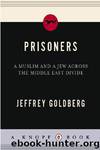Prisoners by Jeffrey Goldberg

Author:Jeffrey Goldberg [Goldberg, Jeffrey]
Language: eng
Format: epub
ISBN: 0307265978
Publisher: Knopf Doubleday Publishing Group
Published: 2006-10-03T04:00:00+00:00
One day I asked Rafiq why Fatah allowed Hamas to teach its principles at Ketziot. “Freedom of speech,” he said.
The curricula were astonishingly different. The Hamas understanding of the world was purely theological: Its metaphysicians taught eschatology and numerology; the ideology of the Muslim Brotherhood, a fundamentalist group; and shari’a, Islamic law. Fatah, on the other hand, ran more of a trade school: There was some common ground with Hamas—both groups believed that the cultivation of correct group memory was supremely important—but Fatah instituted classes on such subjects as the smoking out of collaborators and the proper methods of resisting Shabak interrogators.
There were crucial differences in their approach to history. Fatah, unlike Hamas, differentiated between “Jews” and “Zionists.” Hamas taught that the Jews were knights in Satan’s service; Fatah took a slightly more sophisticated, though still wrongheaded, approach. One of the chief Fatah men in the block, a Gazan in his thirties named Rashid Abu Shbak, explained, “There is no problem with Jews. It’s with a European colonialist mentality that exploited the Jews for the purposes of imperialism.”
Much Fatah talk was a stale echo of Third World liberation ideology. Its misunderstanding of Zionism was profound: Zionists were seen as the agents of Cecil Rhodes, sent off by London to put the wogs under heel. But it was a crime against history to call the Jews, Europe’s longest-suffering victims, the new face of European imperialism.
This dissenting view was not mentioned, of course, in Revolutionary University. The atmosphere at Ketziot was not exactly one of raucous academic freedom, of course. The prisoners could not keep notebooks (though many did anyway), and we censored their reading material. Though I recognized that the First Amendment did not apply to a closed military zone in the Negev Desert, I nevertheless could not bring myself to be keenly vigilant in my enforcement of the censorship rules. The authorities had even banned Hamlet from the prison reading list. Shakespeare, after all, preemptively endorsed the Palestinian uprising, according to the army’s reading of Hamlet’s soliloquy.
“Whether ’tis nobler in the mind to suffer / The slings and arrows of outrageous fortune, / Or to take arms against a sea of troubles, / And by opposing end them?” Hamlet asks. I could not quite imagine that the ban by the prison administration on Hamlet was true, but I checked, and it was.
The prisoners were allowed to read the Quran and the hadith, a collection of the sayings of the Prophet Muhammad. I had not yet read the Quran, but I was told that it was not particularly friendly to the Jews, even more unfriendly than Shakespeare. But it would have been quite a mess to ban the Quran. Certain Israeli books—The Revolt, by Menachem Begin, for instance—were permitted. The Revolt, according to my unscientific poll, was the most popular book on the block. In it, Begin recounted the story of the Irgun’s violent campaign against the Arabs and the British. The book was translated into Arabic, sometime before, by a high-ranking Fatah prisoner named Jibril Rajoub.
Download
This site does not store any files on its server. We only index and link to content provided by other sites. Please contact the content providers to delete copyright contents if any and email us, we'll remove relevant links or contents immediately.
| Africa | Asia |
| Canadian | Europe |
| Holocaust | Latin America |
| Middle East | United States |
Fanny Burney by Claire Harman(26605)
Empire of the Sikhs by Patwant Singh(23089)
Out of India by Michael Foss(16856)
Leonardo da Vinci by Walter Isaacson(13339)
Small Great Things by Jodi Picoult(7148)
The Six Wives Of Henry VIII (WOMEN IN HISTORY) by Fraser Antonia(5518)
The Wind in My Hair by Masih Alinejad(5098)
A Higher Loyalty: Truth, Lies, and Leadership by James Comey(4965)
The Crown by Robert Lacey(4818)
The Lonely City by Olivia Laing(4804)
Millionaire: The Philanderer, Gambler, and Duelist Who Invented Modern Finance by Janet Gleeson(4481)
The Iron Duke by The Iron Duke(4362)
Papillon (English) by Henri Charrière(4277)
Sticky Fingers by Joe Hagan(4204)
Joan of Arc by Mary Gordon(4116)
Alive: The Story of the Andes Survivors by Piers Paul Read(4035)
Stalin by Stephen Kotkin(3970)
Aleister Crowley: The Biography by Tobias Churton(3642)
Ants Among Elephants by Sujatha Gidla(3468)
